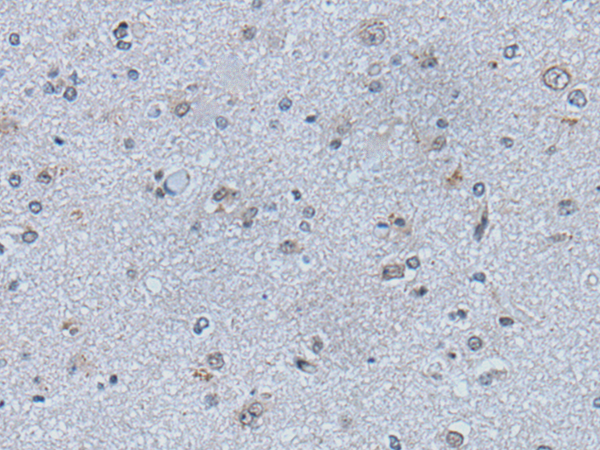
| WB | 咨询技术 | Human,Mouse,Rat |
| IF | 咨询技术 | Human,Mouse,Rat |
| IHC | 1/30-1/150 | Human,Mouse,Rat |
| ICC | 技术咨询 | Human,Mouse,Rat |
| FCM | 咨询技术 | Human,Mouse,Rat |
| Elisa | 1/5000-1/10000 | Human,Mouse,Rat |
| Aliases | CFND; CFNS; EFB1; EFL3; EPLG2; Elk-L; LERK2 |
| Host/Isotype | Rabbit IgG |
| Antibody Type | Primary antibody |
| Storage | Store at 4°C short term. Aliquot and store at -20°C long term. Avoid freeze/thaw cycles. |
| Species Reactivity | Human, Mouse, Rat |
| Immunogen | Synthetic peptide of human EFNB1 |
| Formulation | Purified antibody in PBS with 0.05% sodium azide and 50% glycerol. |
+ +
以下是关于EFNB1抗体的3篇示例参考文献(内容为示例,非真实文献):
1. **"EFNB1 Antibody Validation in Tumor Microenvironment Analysis"**
*Authors: Smith A, et al.*
*摘要:* 本研究验证了EFNB1抗体在免疫组织化学(IHC)中的特异性,并发现EFNB1在乳腺癌组织中高表达,与淋巴转移和不良预后显著相关。
2. **"Ephrin-B1 Regulates Axon Guidance via Antibody-Mediated Blockade"**
*Authors: Lee B, et al.*
*摘要:* 通过EFNB1抗体阻断实验,证明Ephrin-B1蛋白在体外神经元轴突导向中的关键作用,揭示了其与Eph受体相互作用的分子机制。
3. **"EFNB1 Antibody Application in Vascular Development Studies"**
*Authors: Garcia C, et al.*
*摘要:* 利用EFNB1抗体进行斑马鱼模型研究,发现Ephrin-B1通过调控内皮细胞迁移影响胚胎血管生成,为治疗血管疾病提供新靶点。
(注:以上为模拟文献,实际引用时需以真实数据库检索结果为准。)
The EFNB1 antibody is a crucial tool for studying the ephrin-B1 protein, a member of the ephrin family that binds to Eph receptors to mediate cell-cell communication. Ephrin-B1 (encoded by the *EFNB1* gene) is a transmembrane ligand involved in developmental processes, tissue patterning, and angiogenesis. It plays roles in cell adhesion, migration, and boundary formation through bidirectional signaling with Eph receptors, influencing both the ligand-presenting ("forward" signaling) and receptor-expressing cells ("reverse" signaling). Dysregulation of EFNB1 is linked to cancer progression, vascular abnormalities, and neurological disorders.
EFNB1 antibodies are widely used in research to detect protein expression, localization, and interactions via techniques like Western blotting, immunohistochemistry, and flow cytometry. They help elucidate EFNB1's role in tumor microenvironment modulation, metastasis, and vascular development. Some antibodies target specific domains (e.g., the extracellular Eph-binding region or intracellular signaling motifs) to study functional mechanisms or block receptor-ligand interactions. Monoclonal and polyclonal variants exist, with validation often including knockout cell lines or tissue models to ensure specificity.
As EFNB1 gains attention as a therapeutic target, these antibodies also support drug discovery efforts, such as evaluating inhibitors that disrupt EFNB1-Eph interactions in cancer or regenerative medicine. Researchers must consider antibody clonality, species reactivity, and application-specific validation to ensure reliable results.
×